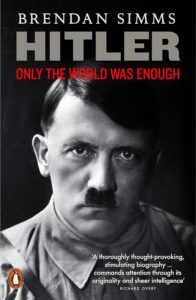 Hitler sometimes liked to say that the hard part was reviving Germany domestically; thereafter, dealing with her foreign enemies would be easy. In reality, he was under no illusions.
Hitler sometimes liked to say that the hard part was reviving Germany domestically; thereafter, dealing with her foreign enemies would be easy. In reality, he was under no illusions.
A nationalist revival would make Germany ‘capable of making an alliance’ again, but this was only a necessary, not a sufficient condition to secure her position in the world. That would require actual allies. Temperamentally, Hitler was not averse to a Russian alliance, preferably without the communists, but if necessary with them. ‘We must try to connect to the national [and] anti-Semitic Russia,’ he demanded, ‘not to the Soviets.’
That said, in August 1920, nineteen years before the Hitler-Stalin Pact, he remarked that he would ‘ally not only with Bolshevism but even with the devil in order to move against France and Britain’. He feared, however, that this attempt to break free through a Russo-German pact would simply be crushed by the British and French. A British alliance was far more desirable, if that country could be kept out of the hands of the Jews.
Instead, Hitler looked further afield, at least conceptually. He hoped that he could confront the forces of international financial capitalism with the united front of the ‘International of the productive’, to mobilize ‘voices for the defence of the rights of the productive peoples’. Germany would spearhead this effort, by purifying itself first. Hitler demanded no less than a pan-Aryan international anti-Semitic front. Inverting the Communist Manifesto’s famous slogan, he announced: ‘not proletarians of all countries unite, but anti-Semites of all countries unite!” Aryans and anti-Semites of all peoples,’ he elaborated, ‘unite to fight against the Jewish race of exploiters and oppressors of all peoples.’ He repeated these injunctions in various forms on many occasions throughout the early 1920s, and indeed beyond. Though Hitler never suggested that Nazism was ‘for export’, he was clear from the beginning that his programme required a high degree of international cooperation among international anti-Semites to compensate for Germany’s weakness.
In the long run he believed that none of this would make any difference unless Germany solved the question of ‘space’.